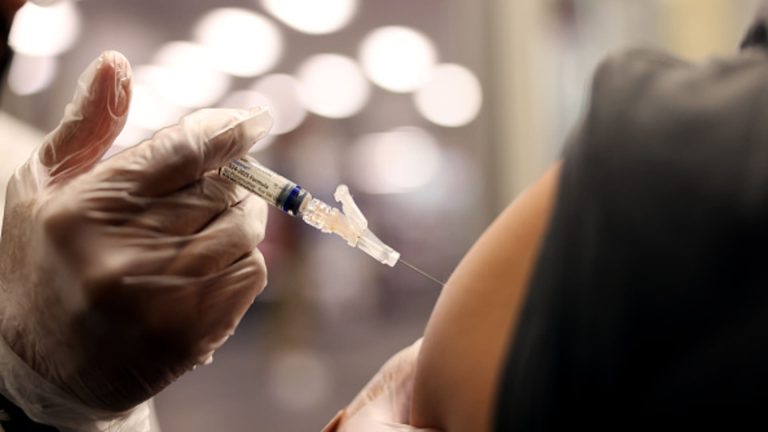Brandon Guerrero, of Compton, California, is given both a flu and Covid vaccine at CVS in Huntington Park, California, Aug. 28, 2024.
Christina House | Los Angeles Times | Getty Images
The Food and Drug Administration on Tuesday outlined new regulatory guidance for future Covid-19 vaccine boosters, setting stricter approval standards for healthy Americans.
The agency said it wants to see new clinical trials showing Covid shots are still safe and effective before approving them for healthy adults and children, a costly new requirement for pharmaceutical companies that could limit who gets new jabs each year. Previously, the FDA typically approved updated Covid shots for all Americans each year based on simple tests that show they trigger a strong enough antibody response.
The FDA recommended different standards of evidence for approval based on patients’ risk of getting severely sick from Covid, according to a paper published Tuesday in the New England Journal of Medicine. The paper’s authors are FDA Commissioner Marty Makary and Vinay Prasad, an outspoken critic of the pharmaceutical industry who was appointed to lead the agency’s division that oversees vaccines.
“The FDA’s new Covid-19 philosophy represents a balance of regulatory flexibility and a commitment to gold-standard science,” the agency said in the paper. “The FDA will approve vaccines for high-risk persons and, at the same time, demand robust, gold-standard data on persons at low risk.”
The new guidance comes as Health and Human Services Secretary Robert F. Kennedy Jr., a prominent vaccine skeptic, overhauls the nation’s health agencies and U.S. immunization policy.
For adults 65 and older, and for people as young as 6 months who have certain underlying health conditions, the FDA said it will accept immunogenicity data — which shows a vaccine generates a strong immune response — as enough to determine that a shot’s benefits outweigh its risks. The FDA estimates that 100 to 200 million Americans have conditions that put them at high risk of severe illness, including obesity and mental health conditions such as depression.
But for healthy people between 6 months and 64 years old who don’t have risk factors, the FDA plans to require stronger evidence for vaccines from randomized, controlled trials. The agency said these studies must show actual clinical outcomes, such as fewer infections or hospitalizations, before it will grant full approval of a shot.
“Our policy also balances the need for evidence,” Makary and Prasad wrote. “We simply don’t know
whether a healthy 52-year-old woman with a normal BMI who has had Covid-19 three times and has received six previous doses of a Covid-19 vaccine will benefit from the seventh dose.”
The FDA said that when it approves a Covid vaccine for high-risk people, it will encourage manufacturers to conduct randomized, controlled clinical trials in healthy adults as part of their post-marketing commitment for the shot.
Makary and Prasad argued that the nation’s “one-size-fits-all” Covid vaccine policy approach, which recommends annual shots for all Americans above six months old, is outdated and no longer in line with other countries. All other high-income nations limit vaccine recommendations to older adults or those at high risk for severe illness due to Covid, they said.
They said the benefit of repeat vaccinations is “uncertain,” particularly among low-risk patients who have developed some immune protection through previous shots, infections or both. Makary and Prasad said many Americans and health-care providers “remain unconvinced” of that benefit, pointing to data from the Centers for Disease Control and Prevention on falling vaccination rates in the U.S. for annual Covid boosters.
They cited CDC data that indicates that for the past two seasons, fewer than 25% of Americans have received a Covid-19 shot, including fewer than 10% of kids and fewer than 50% of adults over the age of 75. Less than one-third of health-care workers received updated Covid boosters in the 2023 to 2024 season, they said, citing CDC data.
They also suggested that broad Covid vaccine recommendations each year have contributed to declining trust in vaccination, including in the measles-mumps-rubella vaccine. Still, Makary and Prasad called MMR vaccines “clearly established as safe and highly effective.”
Makary and Prasad will further address the new framework during a virtual town hall on Tuesday at 1 p.m. ET.

